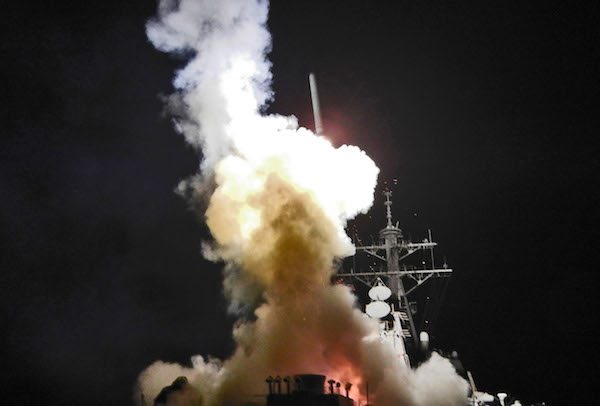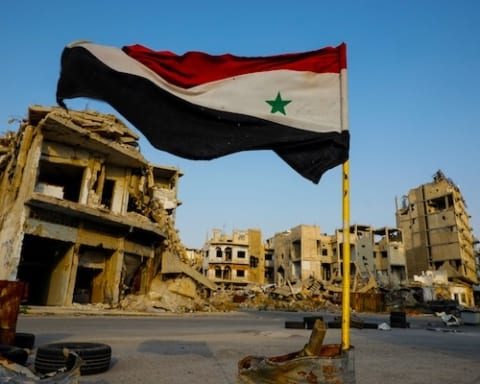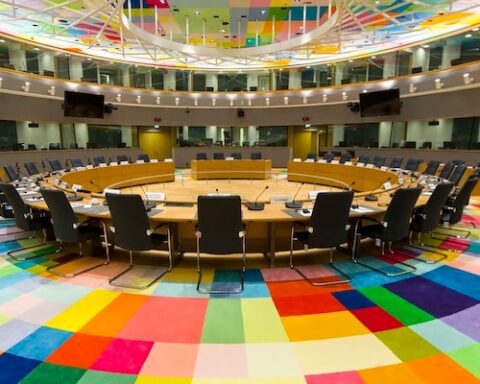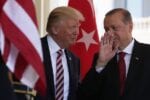Here is what we know:
The U.S. launched a Tomahawk cruise missile attack from nearby destroyers in the east Mediterranean against a Syrian air base in response to a suspected chemical weapons attack on a rebel-held town. President Trump called on “civilized nations to end the bloodshed in Syria.”
(RED SEA (Sept 23, 2014) The guided-missile destroyer USS Arleigh Burke (DDG 51) launches Tomahawk Land-Attack Missiles (TLAM) against ISIL targets)
BBC reports the following:
White House spokesman said the site targeted by the cruise missiles “was directly linked to the horrific chemical weapons attack.” The nerve agent attack was allegedly launched against civilians in the town of Khan Sheikhoun in Idlib province.
“We assess with a high degree of confidence that the chemical weapons attack earlier this week was launched from this site by air assets under the command of the Assad regime,” the official continued.
“We also assess, with a similar degree of confidence, that the Assad regime used a chemical nerve agent consistent with Sarin in these attacks.”
A statement on Syrian state TV said “American aggression” had targeted a Syrian military base with “a number of missiles” but gave no further details.
Earlier on Thursday, US Secretary of State Rex Tillerson signalled a sudden shift in policy by the Trump administration, saying that Syrian leader Bashar al-Assad should have no role in a future Syria.
What else do we know?
Following a UN Security Council meeting earlier on Thursday that failed to reach an agreement on demands for a thorough investigation of the suspected chemical attack in Syria, Russia’s Ambassador Vladimir Safronkov warned the United States there could be “negative consequences” if Washington took military action in Syria.
“All responsibility if military action occurs will be on the shoulders of those who initiated such a doubtful tragic enterprise,” Safronkov said.
“We have to think about the negative consequences.”
“Look at Iraq, look at Libya,” he said referring to U.S. interventions, implying negative results.
The Russian Foreign Ministry issued a statement Friday:
“The Russian Federation has invariably held the unequivocal and straightforward position that any use of chemical weapons by anyone is absolutely unacceptable under any circumstances, and those responsible for such crimes must be held accountable.”
Russia issues statement criticizing "red line" approach, advocates UN Security Council focus on "chemical terrorism" https://t.co/HTLqDiMET0 pic.twitter.com/ds4MGhfv34
— LIMA CHARLIE NEWS | WORLD (@LimaCharlieNews) April 8, 2017
So, did a chemical attack really happen?
It would seem very risky on Assad’s part to do something that would turn world opinion decidedly against him, especially given that with Russia’s help, he has recovered a great deal of lost terrain. Why would he infuriate, if not allies, at least casual observers into being against him. And indeed, Assad’s regime has claimed that it has been bombing rebel chemical weapons depots, not using chemical weapons. The implication being that in getting rid of chemical weapons, the Syrian Army accidentally exposed civilians to the chemicals.
Even so, AFP reports that the Organization for Prohibition of Chemical Weapons, a watchdog organization, has pointed to accounts of Turkish health officials showing at least 86 people, including 27 children, were killed in Khan Sheikhun and over 500 others wounded immediately after the Syrian bombings. Results from post-mortems performed on victims point to possible exposure to the banned nerve agent Sarin.
Russia has bemoaned the reports and has called into question their veracity and bias. That’s a perplexing position to take given that either (a) the chemical attacks didn’t happen, or (b) the casualties resulted from unintended consequences of bombings. Why question the reports?
What does it all mean?
It depends on what you think matters most. Let’s discuss brass tacks and then delve into the speculative.
First, what’s next? Well, the options are to continue the missile barrage, an air offensive, or commitment of ground troops. Let’s start from the most extreme.
The U.S simply does not have the ground troops trained and available to commit to a ground offensive. Most units are still in various stages of reset from the previous years of COIN operations. Direct action is something that the U.S military is still trying to recapture from its Cold War training era. Even if some of the U.S. “911” rapid response units, which are supposed to maintain a high level of readiness, were to be called on, who do you tell them is the enemy? Is it Assad’s military? That brings the U.S too close to fighting against the Russians, who are fighting alongside Assad’s troops.
Is it ISIS? If the U.S. strictly targets ISIS, it is essentially backing Assad’s regime. In this case, it would be good to remember that whenever the U.S. has sent its forces to fight unclear enemies, it has obtained unclear results at the cost of many American and foreign lives.
An air strikes-only option is available, but remembering last year’s debacle between Russian and Turkish airspace conflicts, adding a third party could spell disaster in coordinating fires by bringing another belligerent, namely the US, into the fray. Russia triggered by the cruise missile attack has backed out of the deal brokered between them and the U.S. aimed at minimizing the risk of inflight incidents among coalition and Russian aircraft operating in Syrian airspace. All of this increases the chances of more civilians and Russian soldiers being bombed by accident, setting off an unthinkable chain of events.
Lastly, launching a missile barrage every time a suspected chemical strike occurs may seem like a low-commitment path, but like in the air strike-only option, the likelihood of hitting unintended and potentially civilian targets increases without having a positive identification from ground forces.

From a political perspective, in 2013 then not-yet presidential candidate Trump lampooned the idea of intervention in Syria. He instead offered that the “Arab league should pay” implying that the Middle East’s problems should be handled by the nations of the Middle East. The President’s current actions seem to be a reversal of that previous position. Not that it is a bad thing in itself, but the complexity of the situation calls for better communication of the White House’s sudden and new position on the ongoing crisis to at least the American people, if not the world.
Also, Democrats will undoubtedly use this positional change as ammunition against the President. Oddly enough, among the early critics have been Senators Mike Lee and Rand Paul, two Republicans, voicing opposition to the President’s unilateral use of military force, the Authorization for Use of Military Force (AUMF), instead of seeking Congressional approval.
It’s interesting that the President didn’t seek Congressional approval in attacking Syria, unlike his predecessor, given that his party holds majority in both chambers and that many Democrats, including his former adversary Hillary Clinton, were hawkish on intervention in Syria. Is it possible that in counting the potential votes, two factors came into play: 1. Democrats would have changed their position just to further frustrate the President and 2. Non-interventionist Republicans could not be counted on for support, such as Lee and Rand, further sending the Republican Party into disarray after the ACA repeal attempt? These two possibilities alone could have shown the White House’s weakened political capital and therefore, made it too risky to attempt Congressional approval.
Who wins?
No one. Hopefully the Syrian people? Maybe really far down the road. What’s true is that when a taunting match becomes an actual fight, with actual bullets and bombs, there are bound to be bodies and rarely, if ever in modern times, the bodies of those who did the taunting.
To quote former President Obama, “dropping bombs on someone to prove that you’re willing to drop bombs on someone is just the worst reason to use force.” However, many would argue that this is not just a show of force, but a response to the use of chemical weapons, which is a clear violation of ICRC customary international humanitarian law and the 1925 Geneva Protocol.
It is very likely chemical weapons were and are being used. It is also possible, though unlikely, that this chemical attack was a ruse by rebels to gain international support. Reuters and other wire services have previously reported that rebels have shelled government-controlled civilian areas and passed the blame to Assad’s regime. All of this is definitely conjecture worthy of tin-foil hats. However, with news breaking just yesterday that the U.S. warned the Russians of the impending cruise missile attack, conspiracy theories would have you follow the logical path that when Russia was informed, they in turn informed Assad, who was able to clear the airfield, allow it to be attacked, begin using it less than 24 hours later and everyone “wins.” The U.S. gets to flex its muscle, the Russians get to stand their ground, and Assad can continue to claim it was destroying rebel chemical weapons depots, all with a thin veneer of plausibility.
With the U.S.’s track record of claiming the existence of weapons of mass destruction in other places, to later have little proof, it seems as if the U.S. needs to clearly show cause before attacking. Then again, given the U.S. track record, it usually doesn’t.
In the war for credibility, it appears there are more ways to lose than to win.
Jose Robledo, Political Correspondent, Lima Charlie News
Jose Robledo is a former Army Staff Sergeant still Army Infantry Officer. After completing two combat tours, to Afghanistan and Iraq, he studied Political Economy at Columbia University, where he successfully led the student initiative to bring back ROTC to the campus.
Lima Charlie provides global news, insight & analysis by military veterans and service members Worldwide.
For up-to-date news, please follow us on twitter at @LimaCharlieNews




![The Mind of Bolton - AUMF and the New Iran War [Lima Charlie News]](https://limacharlienews.com/wp-content/uploads/2019/05/Inside-the-mind-of-Bolton-Lima-Charlie-News-main-01-480x384.png)






